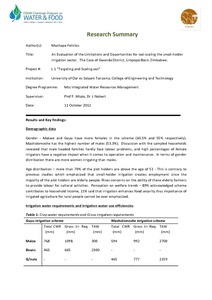Resource information
Results and Key findings:
Demographic data
Gender - Makwe and Guyu have more females in the scheme (60.5% and 55% respectively). Masholomoshe has the highest number of males (53.3%). Discussion with the sampled households revealed that male headed families hardly face labour problems, and high percentages of female irrigators have a negative impact when it comes to operation and maintenance. In terms of gender distribution there are more women irrigating than males.
Age distribution – more than 70% of the plot holders are above the age of 51 - This is contrary to previous studies which emphasized that small-holder irrigation creates employment since the majority of the plot holders are elderly people. Rises concerns on the ability of these elderly farmers to provide labour for cultural activities. Perception on welfare trends – 89% acknowledged scheme contributes to household income, 11% said that irrigation enhances food security thus importance of irrigated agriculture for rural people cannot be over emphasized.


